What Happens To Your Body When You Eat Oatmeal Every Day
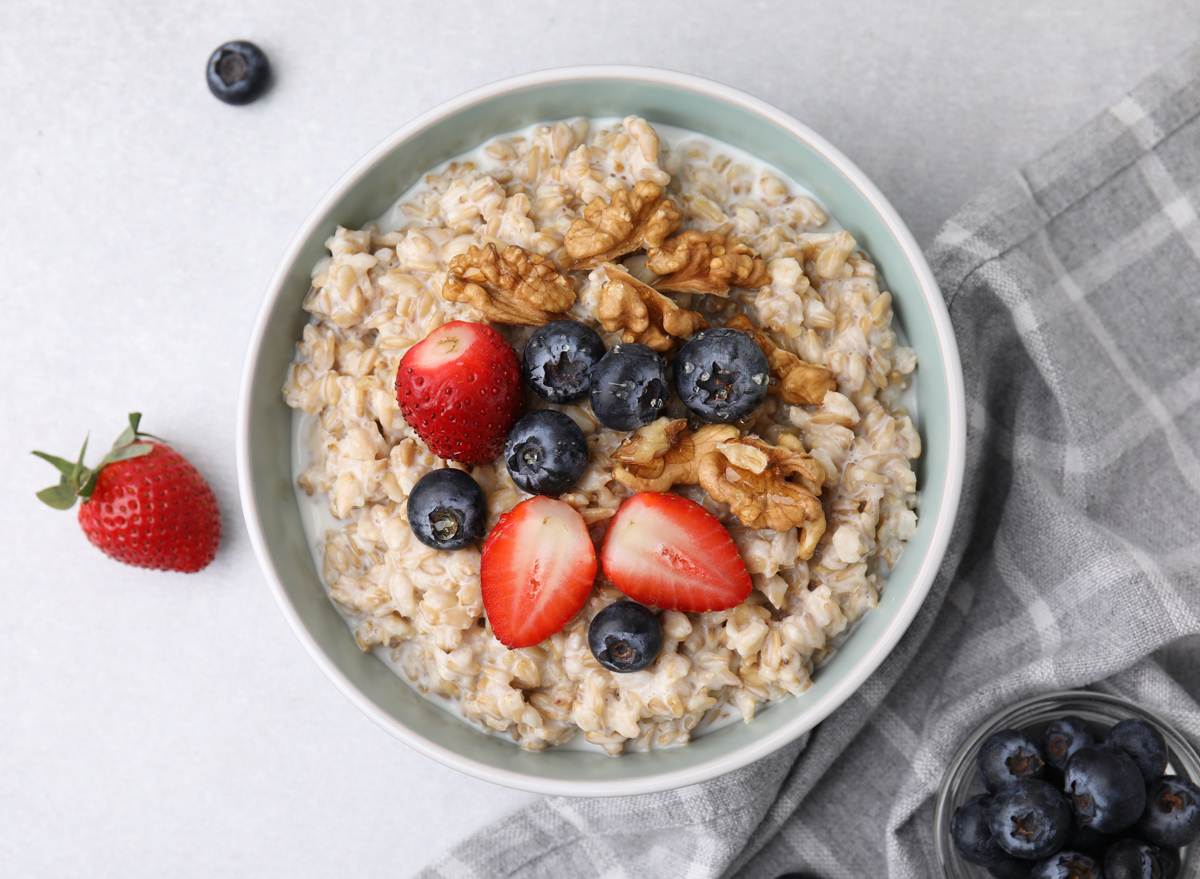
Everyone is singing the praises of oatmeal lately—and for good reason. Known for its health benefits and great taste, this whole grain breakfast food seems like a winning choice. But is oatmeal healthy? Are all of the side effects of eating oatmeal positive, or are there negative side effects we should know about?
We turned to registered dietitians and explored the research to uncover what happens when you eat oatmeal every day. Here’s what experts have to say about making oatmeal a regular part of your routine, including the potential upsides and a few things to watch out for. Before you head out to the grocery store, check out 8 Healthiest Oatmeal Brands—and 4 To Avoid.
Oatmeal Nutrition
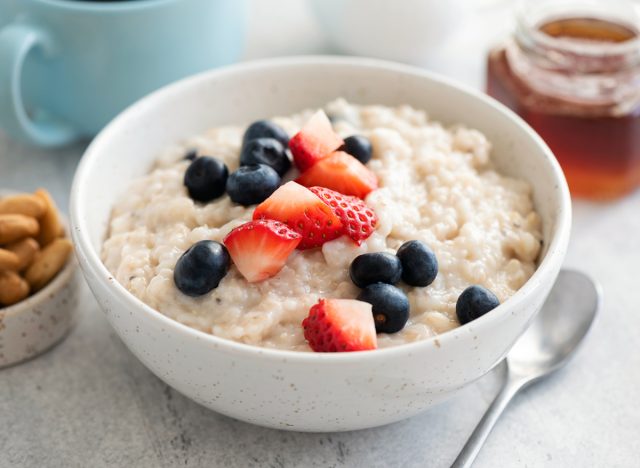
Calories: 166
Fat: 3.5 g (Saturated Fat: 0.5 g)
Sodium: 10 mg
Carbs: 28 g (Fiber: 4 g, Sugar: <1 g)
Protein: 6 g
Iron: 2.1 mg
Magnesium: 63 mg
Prepared oats are a nutrient-dense, low-calorie, and low-fat meal option. Oatmeal stands out for its high fiber content (4 grams, 14% DV), iron (2.1 mg, 12% DV), and magnesium (63 mg, 15% DV). With 6 grams of protein per cup, oatmeal also provides as much protein as an egg, making it a balanced choice for various diet goals.
12 Benefits of Oatmeal
- It's a good source of fiber.
- Eating oatmeal every day can help you feel full.
- Oatmeal can help you lose weight.
- It can lower 'bad' cholesterol.
- It can help you in the bathroom.
- It can help you control your blood sugar.
- It supports gut health.
- Eating oatmeal every day is great for your heart health.
- It's a source of protein.
- It's an excellent source of many essential nutrients.
- Oatmeal may lower inflammation.
- You may live longer.
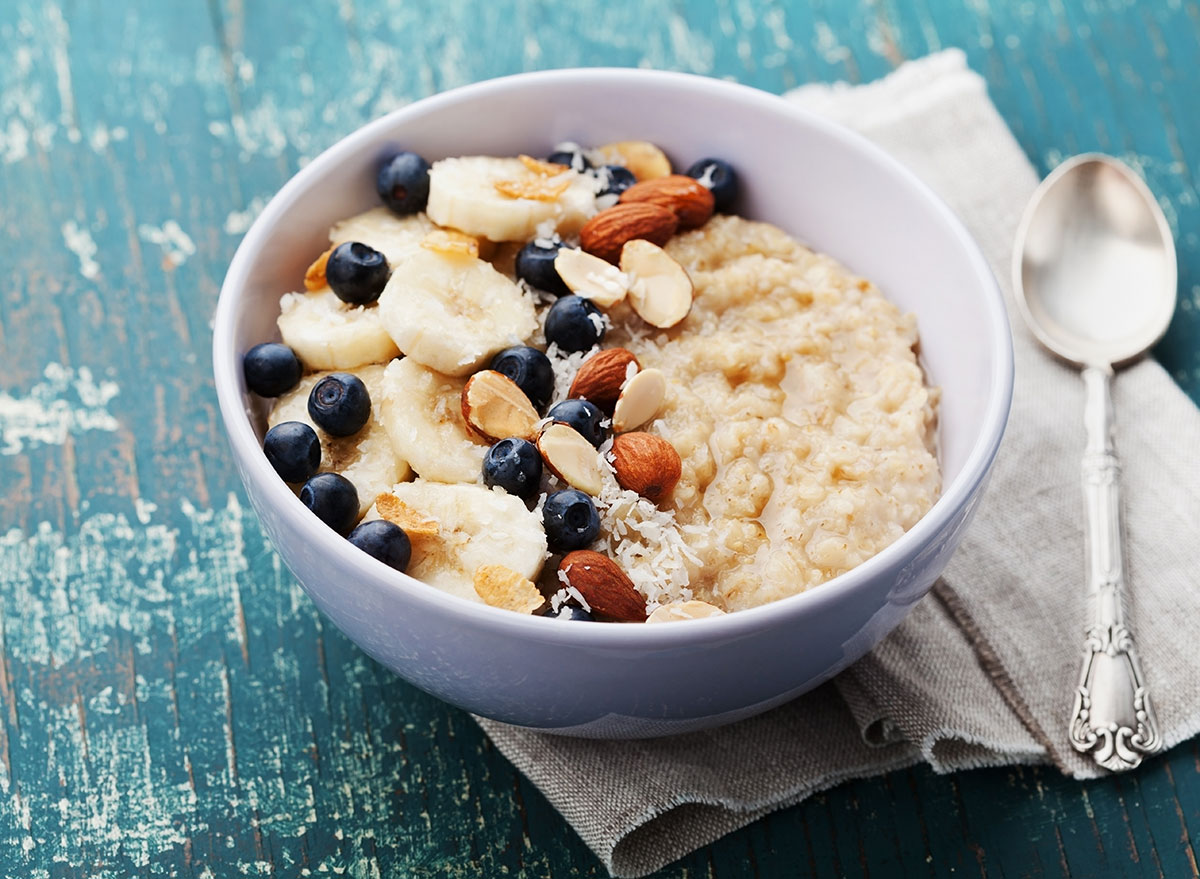
It’s a good source of fiber.
Only 7% of Americans are eating enough fiber—a nutrient required for several aspects of your well-being, including managing cholesterol levels, supporting digestive health, managing weight, and controlling blood sugar. Eating oatmeal every day can help you meet the daily recommended fiber intake of 28 grams set by the USDA, which should be a bare minimum.
One prepared cup of rolled oats made with water serves up 4 grams of fiber, which is 14% of your daily value (DV) of the under-consumed nutrient. Add-ons like chia seeds, flaxseed, nuts, and berries will increase this fiber content even more.
Eating oatmeal every day can help you feel full.
Many of the answers to “is oatmeal good for you” come back to the fiber in oatmeal.
“Oatmeal is a whole grain that is high in fiber, especially soluble fiber,” says Emily Danckers, MS, RD. “When you eat soluble fiber, your digestion is slowed down, which can also increase feelings of fullness.”
The main type of soluble fiber found in oats is called beta-glucan, which a review published in the journal Nutrition Reviews found to have a positive effect on perceptions of satiety. For example, one study found that old-fashioned oatmeal and instant oatmeal significantly increased appetite control over four hours compared to eating ready-to-eat breakfast cereal.
Topping your oatmeal with other satiating ingredients like “protein and/or fat like nuts, often keeps people full for hours,” says Rachel Paul, PhD, RD, CDN. “They can then concentrate on their work and other items, before thinking about the next meal. Having a go-to, filling breakfast option like oatmeal creates consistency in one’s life.”
Oatmeal can help you lose weight.
As a good source of digestion-slowing fiber, “[eating oatmeal can] keep the consumer feeling full, which can prevent overeating on calories throughout the day,” says Trista Best, MPH, RD, LD, a registered dietitian and consultant at Balance One Supplements.
A comprehensive 2023 review published in the journal Current Nutrition Reports noted that numerous clinical investigations have found oats to play a role in obesity prevention and lowering body weight.
It can lower ‘bad’ cholesterol.
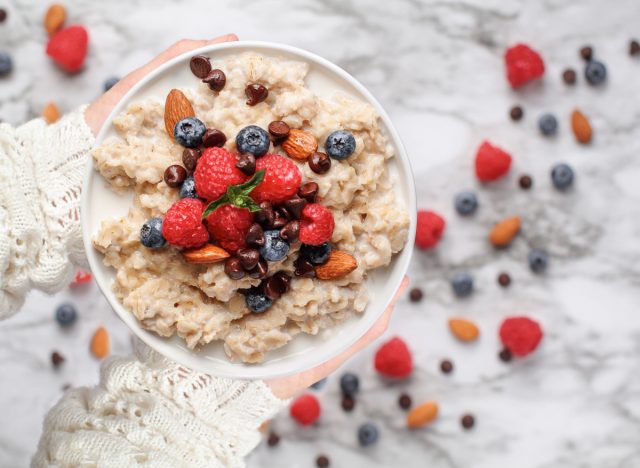
“By eating oatmeal every day, you can lower your total cholesterol level, reduce the ‘bad’ LDL cholesterol, and increase your ‘good’ HDL cholesterol levels,” says Megan Byrd, RD, The Oregon Dietitian.
Once again, this cholesterol-lowering benefit of oatmeal appears to be primarily linked to the presence of beta-glucan, but a Food & Function review notes that “phytosterols, phenolic compounds, tocols, and saponins are other [nutrients in oats] might have a direct or indirect impact on cholesterol levels.”
It can help you in the bathroom.
“Oatmeal’s fiber content contributes to positive gastrointestinal health, including having regular bowel movements,” says Amy Goodson, MS, RD, CSSD, LD, and author of The Sports Nutrition Playbook.
If you haven’t been consuming much fiber and have started eating oatmeal every day, Goodson recommends increasing your fluid intake as you increase your daily fiber intake because fiber binds with water and is necessary for fiber to produce its benefits.
It can help you control your blood sugar.
“Eating oatmeal every day can also help control your blood sugar because it’s high in fiber,” says Byrd. “It helps to slow down the speed at which the carbohydrates in your diet reach your bloodstream, making your blood sugar levels more even during the day. Oatmeal is a superfood, and one that definitely can be eaten every day!”
It supports gut health.
Oats are rich in unique phytochemicals, including beta-glucan, resistant starch, and phenols, that affect the gut microbiome, according to a review published in the journal Foods.
Your gut microbiome is the community of bacteria, fungi, and other microorganisms that live in your gastrointestinal tract, and it plays an essential role in digestive, immune, and even brain health. A healthy gut can help prevent many diseases, like obesity, diabetes, and colorectal cancer.
Many human studies have found that consuming oats can increase levels of beneficial bacteria (including lactobacilli and bifidobacteria) in the gut, whereas consuming the same amount of rice could decrease these levels.
Eating oatmeal every day is great for your heart health.
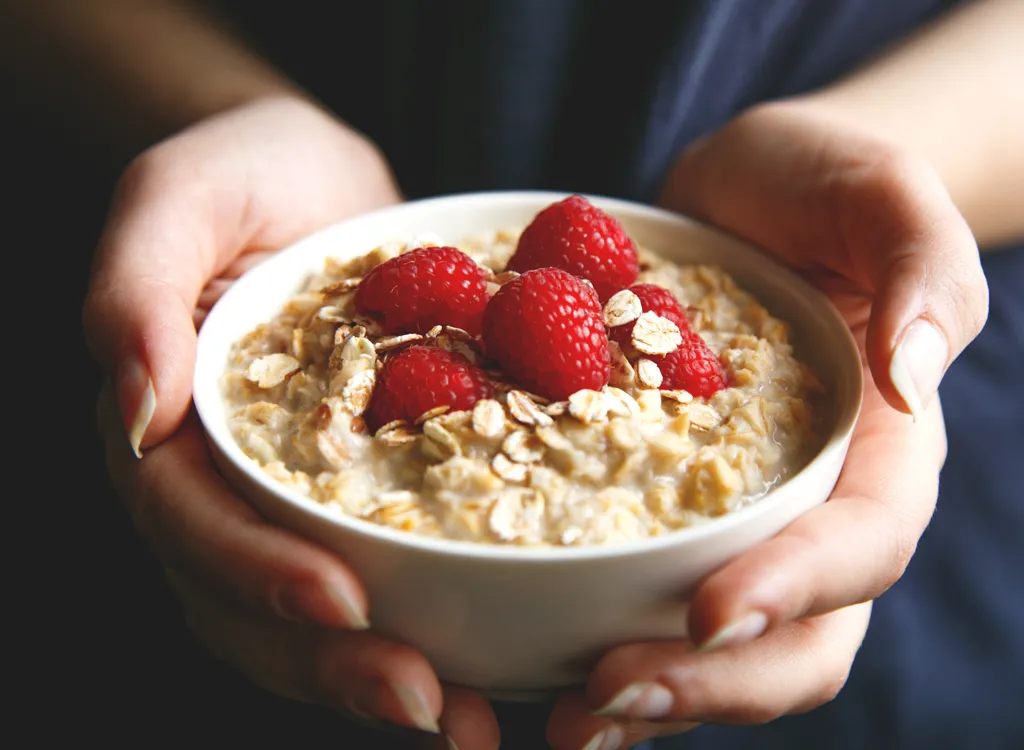
“Oats are an ingredient that has been in the heart-health spotlight for a while,” says Mackenzie Burgess, RDN, registered dietitian nutritionist and recipe developer at Cheerful Choices. “Research continues to show cholesterol-lowering effects from regularly consuming this fiber-rich food. More specifically, the soluble fiber in oatmeal may help reduce our LDL cholesterol.”
Try mixing up your typical oats routine and soak them overnight with different flavor additions or combine them into easy energy bites.
It’s a source of protein.
Oats offer 6 grams of protein in one cup of prepared old-fashioned oats. “Protein, along with fiber, can keep you full longer, says “Brenda Braslow, MS, RD for MyNetDiary.
One study published in the American Journal of Clinical Nutrition found that people who were considered overweight were able to lose weight after increasing their protein intake to 30% of their daily calories. Oatmeal, although it doesn’t have enough protein to last throughout the day, can be a great place to start in the morning when you need a boost of protein.
It’s an excellent source of many essential nutrients.
Oatmeal is a nutrient-dense food, offering essential vitamins and minerals like manganese, phosphorus, magnesium, and iron.
One cup of raw oats contains 19% DV iron, 27% DV magnesium, 27% DV phosphorus, and 128% DV manganese.
And you’ll also reap the benefits of any ingredients you top your oatmeal with. “It is easy to add antioxidant-rich ingredients into your diet when you eat oatmeal regularly. Dried fruit, nuts and seeds, and nut butters are rich in micronutrients that support most health and wellness goals,” says Best.
Oatmeal may lower inflammation.
Chronic inflammation can cause a broad range of health issues, from metabolic disorders to increases in triglycerides to weight gain. If you eat oatmeal every day, you may be able to reduce your risk of these health issues. Numerous studies have observed the anti-inflammatory properties of oats, due in part to the cereal’s beta-glucan content.
You may live longer.
It’s true! Oatmeal is one of the best foods in terms of longevity. According to a study published by the Nutrition Journal, oats can help decrease the risk of autoimmune diseases, heart disease, and even gaining more weight. Plus, having a regular intake of whole grains in your diet has been proven to inverse mortality rates, according to the American Heart Association.
Is Oatmeal Bad for You?
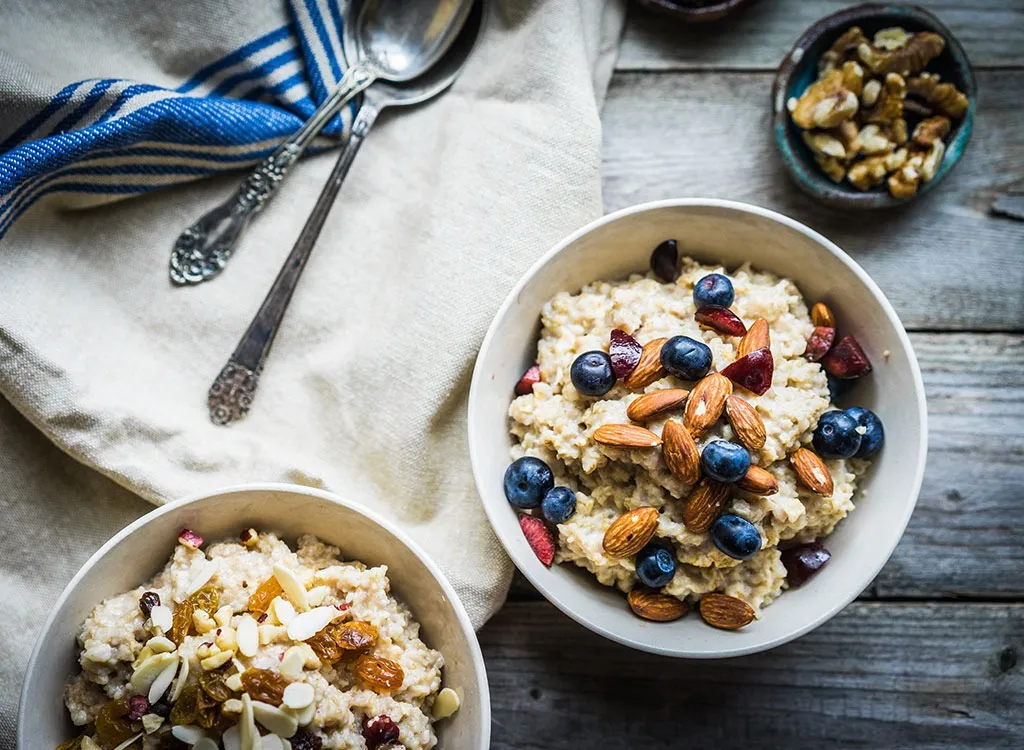
Oatmeal brings many positive benefits to your health. With side effects like better digestion, potential weight loss, better heart health, and greater feelings of fullness, it’s hard to deny that oatmeal is healthy.
However, it’s also important to look at a few of the ways oatmeal can deliver some unwanted side effects, too.
- Possible exposure to the pesticide chlormequat, which may carry reproductive and developmental toxicity concerns.
- May cause belly bloat in some people, especially those new to high-fiber foods.
- Could contribute to weight gain if consumed in excessive portions or with high-calorie toppings.
You may be exposed to a ‘highly toxic agricultural chemical.’
According to a February 2024 study published in the Journal of Exposure Science & Environmental Epidemiology, your oats may be exposing you to a toxic agricultural chemical.
The peer-reviewed study, conducted by the Environmental Working Group (EWG), found detectable levels of chlormequat, a pesticide used on oats, in 80% of Americans tested between 2017 and 2023. Furthermore, the research found detectable levels of chlormequat in 92% of oat-based foods purchased in May 2023, including Quaker Oats. Chlormequat has been linked to reproductive and developmental toxicity in animal studies, raising concerns about its safety and suggesting the potential for similar harm to humans.
While individual exposure levels in the study were below safety thresholds established by regulatory agencies, the EWG warns that cumulative effects of exposure to multiple chemicals can lead to potential health impacts, especially during pregnancy.
The study emphasizes the need for continued monitoring of chlormequat in foods and people, along with further research to understand its health effects at current exposure levels.
Oatmeal may cause some belly bloat
“If you are new to oats, they may cause bloating, so it’s best to start with a small portion,” says Lisa Young, PhD, RDN and author of Finally Full, Finally Slim.
“Whole grains such as wheat and oats contain high fiber, glucose, and starch,” says Shannon Henry, RD, at EZCare Clinic. “All of them are consumed by bacteria in the gut or large intestine, which leads to gas and bloating in a few people. To lessen the side effects, start with a small quantity and increase gradually to the chosen amount. When you start eating oat bran, the harmful outcomes from your body will probably disappear.”
It may cause weight gain.
While eating oatmeal can help you lose weight, overdoing it on your portion sizes can do the exact opposite. “Eating a jumbo serving of oatmeal can lead to weight gain,” says Young. “And watch the toppings—a tablespoon or two of crushed walnuts or flaxseeds is great, but too much butter or sugar isn’t.”
What you’re topping your oatmeal with may also be the cause of potential weight gain. You may add sugar, chocolate chips, and other sweet food items, which ultimately decrease oatmeal’s overall nutritional value as these additions throw in extra calories, unhealthy fats, and sugar.
Final Thoughts: Is Oatmeal Healthy?
Oatmeal is generally a healthy choice, packed with fiber, essential nutrients, and protein, which support heart health, digestive health, weight management, and blood sugar control. Eating oatmeal every day can contribute to a balanced diet and even reduce inflammation and cholesterol levels.
However, potential downsides include the risk of bloating for some and exposure to pesticide residues. Additionally, high-calorie toppings or large portions can offset its benefits.
Overall, oatmeal can be a nutritious addition to your daily routine with mindful preparation.
- Source: https://fdc.nal.usda.gov/fdc-app.html#/food-details/173905/nutrients
- Source: Staff, A. (2021, June 9). Most Americans are not getting enough fiber in our diets. American Society for Nutrition. https://nutrition.org/most-americans-are-not-getting-enough-fiber-in-our-diets/
- Source: U.S. Department of Agriculture. (2023b, November 14). How much (dietary) fiber should I eat? AskUSDA. Retrieved February 20, 2024, from https://ask.usda.gov/s/article/How-much-dietary-fiber-should-I-eat
- Source: FoodData Central. (n.d.-b). https://fdc.nal.usda.gov/fdc-app.html#/food-details/171675/nutrients
- Source: Rebello, C. J., O'Neil, C. E., & Greenway, F. L. (2016). Dietary fiber and satiety: the effects of oats on satiety. Nutrition reviews, 74(2), 131–147. https://doi.org/10.1093/nutrit/nuv063
- Source: http://Rebello, C. J., Chu, Y. F., Johnson, W. D., Martin, C. K., Han, H., Bordenave, N., Shi, Y., O'Shea, M., & Greenway, F. L. (2014). The role of meal viscosity and oat β-glucan characteristics in human appetite control: a randomized crossover trial. Nutrition journal, 13, 49. https://doi.org/10.1186/1475-2891-13-49
- Source: Shehzad, A., Rabail, R., Munir, S., Jan, H., Fernández-Lázaro, D., & Aadil, R. M. (2023). Impact of Oats on Appetite Hormones and Body Weight Management: A Review. Current nutrition reports, 12(1), 66–82. https://doi.org/10.1007/s13668-023-00454-3
- Source: Grundy, M. M., Fardet, A., Tosh, S. M., Rich, G. T., & Wilde, P. J. (2018). Processing of oat: the impact on oat's cholesterol lowering effect. Food & function, 9(3), 1328–1343. https://doi.org/10.1039/c7fo02006f
- Source: Paudel, D., Dhungana, B., Caffe, M., & Krishnan, P. (2021). A Review of Health-Beneficial Properties of Oats. Foods (Basel, Switzerland), 10(11), 2591. https://doi.org/10.3390/foods10112591
- Source: Korczak, R., Kocher, M., & Swanson, K. S. (2020). Effects of oats on gastrointestinal health as assessed by in vitro, animal, and human studies. Nutrition reviews, 78(5), 343–363. https://doi.org/10.1093/nutrit/nuz064
- Source: Weigle, D. S., Breen, P. A., Matthys, C. C., Callahan, H. S., Meeuws, K. E., Burden, V. R., & Purnell, J. Q. (2005). A high-protein diet induces sustained reductions in appetite, ad libitum caloric intake, and body weight despite compensatory changes in diurnal plasma leptin and ghrelin concentrations. The American journal of clinical nutrition, 82(1), 41–48. https://doi.org/10.1093/ajcn.82.1.41
- Source: http://Paudel, D., Dhungana, B., Caffe, M., & Krishnan, P. (2021). A Review of Health-Beneficial Properties of Oats. Foods (Basel, Switzerland), 10(11), 2591. https://doi.org/10.3390/foods10112591
- Source: Zhang, J., Li, L., Song, P., Wang, C., Man, Q., Meng, L., Cai, J., & Kurilich, A. (2012). Randomized controlled trial of oatmeal consumption versus noodle consumption on blood lipids of urban Chinese adults with hypercholesterolemia. Nutrition journal, 11, 54. https://doi.org/10.1186/1475-2891-11-54
- Source: Zong, G., Gao, A., Hu, F. B., & Sun, Q. (2016). Whole Grain Intake and Mortality From All Causes, Cardiovascular Disease, and Cancer: A Meta-Analysis of Prospective Cohort Studies. Circulation, 133(24), 2370–2380. https://doi.org/10.1161/CIRCULATIONAHA.115.021101
- Source: Temkin, A. M., Evans, S., Spyropoulos, D. D., & Naidenko, O. V. (2024). A pilot study of chlormequat in food and urine from adults in the United States from 2017 to 2023. Journal of exposure science & environmental epidemiology, 10.1038/s41370-024-00643-4. Advance online publication. https://doi.org/10.1038/s41370-024-00643-4
- Source: EWG finds little-known toxic chemical in four out of five people tested. (2024, February 15). Environmental Working Group. https://www.ewg.org/news-insights/news/2024/02/ewg-finds-little-known-toxic-chemical-four-out-five-people-tested









